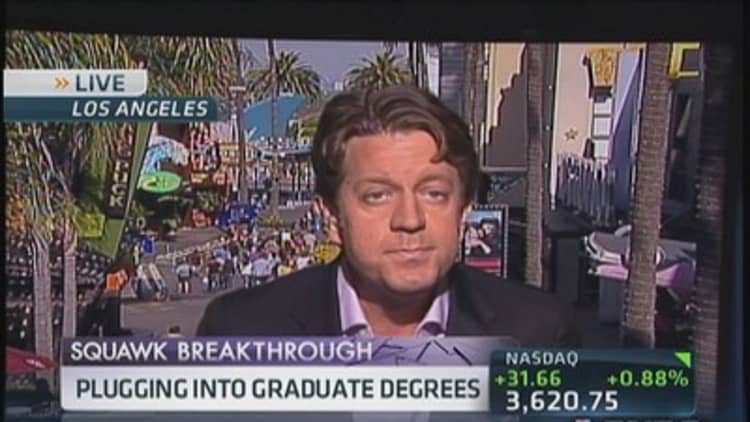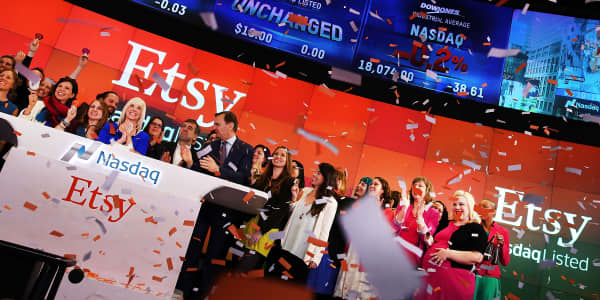An education crisis is good for capitalism, but are the capitalists who are attacking this crisis good for education? Few disruptive companies have attracted as intense a reaction as the online education start-ups, among them Coursera, Udacity, 2U, Knewton and edX. Certainly, Airbnb and Uber run afoul with local regulators in the tightly controlled real estate and lodging industries, but the attacks on the online education start-ups are arguably the broadest and most vocal of any response to business disruption in the world today.
Yet something has to give.
Average student loan debt is now twice consumer credit, and since the financial crisis has moved ahead of consumer credit in total market size—second only to mortgage debt as a form of lending in the U.S.—there is roughly $1 trillion in total outstanding student loan debt in the U.S. As of the first quarter of 2012, the average student loan balance for all age groups was $24,301: About one-quarter of borrowers owe more than $28,000; 10 percent of borrowers owe more than $54,000; 3 percent owe more than $100,000; and less than 1 percent, or 167,000 people, owe more than $200,000, according to the Federal Reserve Bank of New York.
(Read more: Is an iTunes U degree in your future?)
As of October 2012, the average amount of student loan debt for the Class of 2011 was $26,600, a 5 percent increase from approximately $25,350 in 2010, according to The Project on Student Debt.
"I don't think $25,000 is an acceptable level of debt," said Tamara Draut, vice president of policy and research at Demos. "The earnings of the typical graduate have not gone up enough to absorb $25,000 in debt. This is now a significant financial obligation we are saddling people with before they even get into the real world."
Every time you come to innovation, there will be change, but I push back hard because the dominant dialogue is confrontation, and if that stays the dominant dialogue, it's not inspiring and it's not accurate.Sebastian ThrunUdacity CEO and cofounder
Any sector that has the ability to become one of the top forms of lending in one of the world's largest economies has its citizens making a bet that in the end, education will make them a profit, and reasoned gambles are the nature of capitalism.
"There is a need for education, and the need won't go away," said Udacity CEO Sebastian Thrun.
(Read more: Education is the biggest data grab of all)
The American Dream, reimagined
So why do people like Thrun, who seek to make education more affordable and accessible, attract such an intense reaction? "People make it look more confrontational. What we can do is much more inspirational. We can democratize education, reach the world. Not a single person can tell me why that is bad," Thrun said. "Every time you come to innovation, there will be change, but I push back hard because the dominant dialogue is confrontation, and if that stays the dominant dialogue, it's not inspiring and it's not accurate."
Education is intrinsic to the American Dream, like housing—a dream that worked very well for a long while but was weakened by its excesses. It is often referred to as one of the three industries most in need of disruption, alongside health care and financial services. Yet the debate about the online education companies often descends into a reactionary fear that they will wipe out teaching positions across the country or become a repeat performance of the for-profit publicly traded education companies that have come under fire from the Department of Education.
"We have the world's best higher education system, but it is very exclusive and doesn't have the impact it should," Thrun said. "One way to look at what we are doing is to take the best that we have to offer in education and improve it and bring it to the world," he added. "MOOCs can't reinforce the exclusivity of today."

(Learn more: About the business models of the CNBC Education Disruptors)
The truth is, they may eliminate some teaching jobs, but they may also unburden teachers of chores that impede student learning and optimal student-teacher interaction. "There is a ton of great stuff happening in classes and in person that you can't replicate," Thrun said. "We just want to augment it. Are we satisfied with the current model? No. It is broken, but not every aspect of it. Almost every instructor I know of is hardworking and cares in a way a computer program can never care. MOOCs (massive open online courses) replacing classroom is a red herring. Movies have not replaced stage plays, and TVs have not replaced radio."
Andrew Ng, co-founder of Coursera, said critics often say MOOCs cannot do "X" and either one of two things is true: either a university partner is already doing it, or it is in the works and coming over the next decade. "People said you can't teach humanities online, not true; or host discussions online, not true; or a video chat online, also not true," Ng said. "There are things we can't do, but faculty and universities are rethinking what are the things that cannot be done online or are best done offline."
Ng said one-on-one mentoring, discussions and research work for students are all examples of educational formats that will endure. But he added, "Instructors shouldn't be doing core content; the traditional lecture is not the best way to teach and a web site can free up a teacher to do the things that they are good at."
No free school lunch
The online education start-ups do intend to find a business model that is profitable—even the nonprofit started by Harvard and MIT has to find a way to at least make even on its $60 million investment or it will run out of money in a few years, especially with a per-course development cost that can run into the hundreds of thousands of dollars.
"Entirely for free is problematic too. It does cost to educate people," Thrun said. "I meet kids afraid to start a company because they are so squished with student debt. I'm completely convinced that the best product will prevail, and that will include the best learning outcomes and being the most accessible." He added, "I aspire to bring the savings you can achieve through scale-back to students."
(Read more: The app that might keep kids out of college)
But for many of the education start-ups (unlike the for-profit publicly traded universities), the global market is a larger focus than the U.S. student population. Adaptive-learning content company Knewton CEO Jose Ferreira said by his count between $6 trillion and $7 trillion is spent on global education annually including public and private dollars. "That's one of the biggest industries in the world, and a small fraction of what is being spent is the bloat in American higher education specifically," Ferreira said.
Chip Paucek, CEO of 2U, goes even further, believing there is no reason online education should be priced any differently than traditional education. "I think there will be a profound reshuffling of the deck, even at the highest levels of higher education. Schools had the sandbox to themselves. Education is a trillion-dollar market, and there are plenty of ways to attack it."
The 2U CEO said that while MOOCs have enrolled large numbers of people, 2U has focused on building an online program that is as good or better than the on-campus experience, with degrees that are the exact same on every metric and have a similar price. "Coursera, edX and Udacity lit the world on fire, and the media paid attention, but there is no aspect of this that is a dumbed-down version," Paucek said. "We won't partner with a school if it wants to make education lower quality online," he said. "It can't be extension school or faculty that isn't normal faculty." Total tuition bookings for 2U's programs are expected to reach $230 million by year-end 2013.
Au revoir French 101
Knewton is now in every college in America through its partnership with publisher Pearson, and Ferreira is not shy about discussing the ability for technology to change teaching and eliminate some jobs. "if you have much better technology and you can push out commodity teaching and blend with teaching, it reduces the cost in the long run," he said. "I don't think teachers will get replaced today, but as the French 101 teacher retires, you don't replace them and start offering access to a large repository of online credits."
"In reality, not everyone loses jobs. In reality, a vast market of people you have never reached before is reached, and that is a growth industry," Thrun said.
The Knewton CEO thinks it won't be too long, either, before the education landscape is very different, quoting Harvard Business School professor Clay Christensen's prediction that in less than a decade, half of all higher-education materials will be online. "Publishers will be the first to tell you that. I think Pearson made more money last year from digital than print," he said.
And Ferreira envisions a similar trajectory for higher education in general. "In ten years half of the colleges in America won't exist anymore," Ferreira said. "There will be the big schools, like Arizona State or Penn State, and an ASU will have 500,000 students and their costs will go down, but they have to get better and better teaching at scale, and it's a very disruptive thing."
Christensen actually said it would take 15 years, but Ray Schroeder, associate vice chancellor for online learning at the University of Illinois Springfield, thinks Christensen is off target with half of his prediction: "He's talking about roughly 2,000 universities going bankrupt. But I suspect it will be sooner than 15 years," Schroeder said.
Ng said Christensen's prediction might be on target, but it shouldn't be confused with a belief that the traditional university model isn't valuable. "The four-year residential experience is incredibly valuable and I would hate for MOOCs to come between students and professors," Ng said. He added, "Continuing education, on the other hand; it's very difficult to go back to school, and I think the convenience of online courses is to bring people back to the education system."
"When it comes to people investing their own money, I think they will go for best," Thrun said. And some other things will never change that go to the heart of the confrontation over the future of education: "When it comes to man versus machine, in the history of humanity, man always wins," Thrun said. "We use these tools to make humanity a more powerful thing and bring that back into classroom teaching." That's coming from a professor whose specialty is robotics and who rose to MOOC fame with a course on artificial intelligence.
So what's wrong with a little computer-aided competition?
—By Eric Rosenbaum, CNBC.com
(In May, CNBC launched its inaugural CNBC Disruptor 50 list. The CNBC Education Disruptors is an extension of this annual editorial feature covering the companies upending the status quo in the market's biggest sectors).





